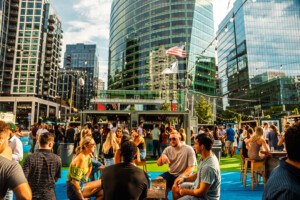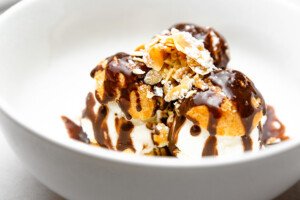Tom Colicchio Talks the Upcoming Season of Top Chef

Photograph by Tommy Garcia/Bravo
Top Chef, a two-time Emmy winner, is heading to Boston for its 12th season on Bravo. The reality competition, which has spawned countless imitators and turned its competitors into culinary superstars, is now doing for food—in Tom Colicchio’s estimation—what Warhol’s Campbell’s Soup did for pop art. We chatted with the glabrous patriarch about the challenges of filming in Boston, his admiration for Ken Oringer, and “the monster” he’s created when it comes to dining out.
How much influence do you have at this point on where Top Chef gets filmed?
Ha! Very little. I’m sure you’re aware of the steps Boston took to get us to go there. It’s really a business decision. People always think it’s a food decision, but it’s a business decision. The tough part is that when we shoot it’s really difficult to get hotel accommodations. It was graduation time in Boston, so it was very, very difficult. We actually found a way around that by having our crew stay at Emerson’s dorms.
Where and what did you make a priority to eat while in Boston?
I’ve been coming up to Boston for years. A lot of my good friends live there, and my son went to boarding school right outside of Boston, so I’ve spent a good amount of time there. I hit up a bunch of Ken Oringer’s spots, Barbara Lynch’s spots, Michael Schlow’s spots. It was just going to friends of mine. I was also going home a lot on my days off because I was so close.
Since you mentioned that you’ve been coming to Boston regularly, how have you seen the food scene develop over the years?
I’ve always thought Boston had a good food scene. I’ve always thought it was underrated. Barbara’s been there a long time, as has Michael [Schlow]. Before them there were chefs like Chris Schlesinger, Lydia Shire, and Jasper White. There’s always been a pretty vibrant scene, it’s just a smaller city. It doesn’t have the breadth of a New York or Los Angeles, but it’s always been there.
It was big news when Jamie Bissonnette and Ken Oringer opened Toro in New York, which happens to be in the same building as Colicchio & Sons. Are there any other Boston restaurants you’d love to see set up shop in New York?
There’s plenty of room for a lot of new restaurants in New York. Would I like to see Barbara Lynch open up a restaurant here? Sure, that would be great. New York is tough on chefs who come from out of town. It doesn’t matter who you are. But Ken and Jamie have done such a great job here. From the beginning, Toro was a huge success. What I like about that is that you can’t point your finger now and go, “New Yorkers don’t want anybody from out of town.” It’s not true! You just have to do what they did and bring it from day one.
How has the rise of social media affected the way you shoot Top Chef?
One of the big differences, especially in the last two years, is that we used to try to keep everything under wraps as much as possible. And people would try to find us and try to figure out who the chefs were ahead of time. In the last two seasons we stopped doing that. It makes it really easy and takes the wind out of the sails out of all these online sites trying to find out where we are. But social media forced our hand on that. We’re open about it; there are no secrets. Now when we’re shooting, people stop by and try to hang out. It adds some fun to the process.
When you started filming Top Chef did you ever imagine it would be as influential as it has been?
Absolutely not! It started off as such a small production that first year in San Francisco. I think we had 30 people on crew, total. Now we have a culinary department of eight people. So, it’s changed a lot. In the first interview I ever did, when I was at a restaurant called Mondrian, a journalist asked me, “what do you want out of this?” I was 26-years-old and I just said, “I want acknowledgment from my peers that I’m giving something back; that I’m doing something worthwhile.” Now I’m on a show getting nominated for Emmy awards. It’s kind of cool to have that recognition from your peers, that it’s a worthwhile TV show. That is something for a million years that I never, ever expected. Personally, the year that we did win an Emmy (2010) I also won a James Beard award for Outstanding Chef. It was a very good year! I actually have them together. I have the medal wrapped around the Emmy. It’s kind of cheeky, but fun.
There are a number of culinary competitions out there at this point, and yet year after year Top Chef find great chefs such as Dale Talde, Paul Qui, and Tiffani Faison. How do you continue to find that level of talent and remain a stalwart in the culinary entertainment field?
I’ll tell you what that comes down to: it’s fighting the fight every season and making sure we get really good chefs on the show. We’re not just casting for personalities or types. We’re casting chefs. We’re looking for talent that’s either at the level of sous chef, chef de cuisine, or executive chef. That’s the criteria. We want to get chefs who are going to go on and make a mark in the industry. We don’t want a flash in the pan who you’ll never hear from again. On the first season we had some students on and home cooks and we saw immediately that they couldn’t compete against professionals. So, at that point you go, “Alright, that’s not going to work anymore.”
We think on the personality side of things, people’s personalities will eventually come through. I also think that once you have someone who is running a kitchen and they have that kind of responsibility, that it prepares them for the rigors of being on the show. The chefs are normally up 16 hours a day with a camera in their face, and every single day they’re cooking and being judged. That’s tough! Typically halfway through the season, the chefs are going, “I had no idea it was going to be this hard.” These are people who are used to standing up 16 to 18 hours a day and they think being on the show is the hardest thing they’ve ever done.
How much credit do you give the show for the current level of enthusiasm the public has for food and dining out?
In the past 15 years, people’s relationships with food have changed an awful lot. I think people watching food TV, period—obviously Top Chef being on the top of that—we’ve given them a vocabulary. It’s really strange to go out and you hear a table critiquing the food. Oh my God! I created this monster. But it is great that it’s become such a big part of pop culture. It’s the Campbell’s Soup can. That’s what it’s become, and that’s fine.
How much longer do you think the show can continue?
I don’t know, eventually we’re going to run out of cities. It’s becoming difficult now because there’s so much TV programming. I don’t how much we’re growing an audience, so it’s getting very competitive and crowded. That’s why we’re always looking for ways to keep the show fresh. We don’t rely on a format and say “that’s it.” In fact, this season we changed up Judge’s Table. It’s going to be very different. As a group, whenever anyone suggests anything, we never dismiss it. It’s little things, like when we were in Chicago in the fourth season, we changed our first deliberations to something spontaneous and in the moment. It’s great that Bravo and the producers, Magical Elves, are willing to let that happen. I think that’s why people are still around and watching.


